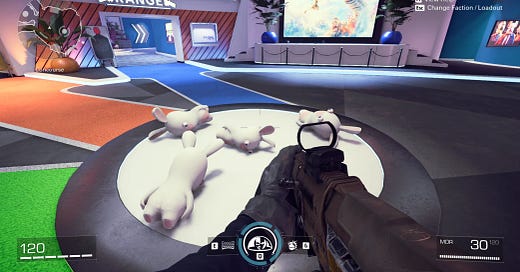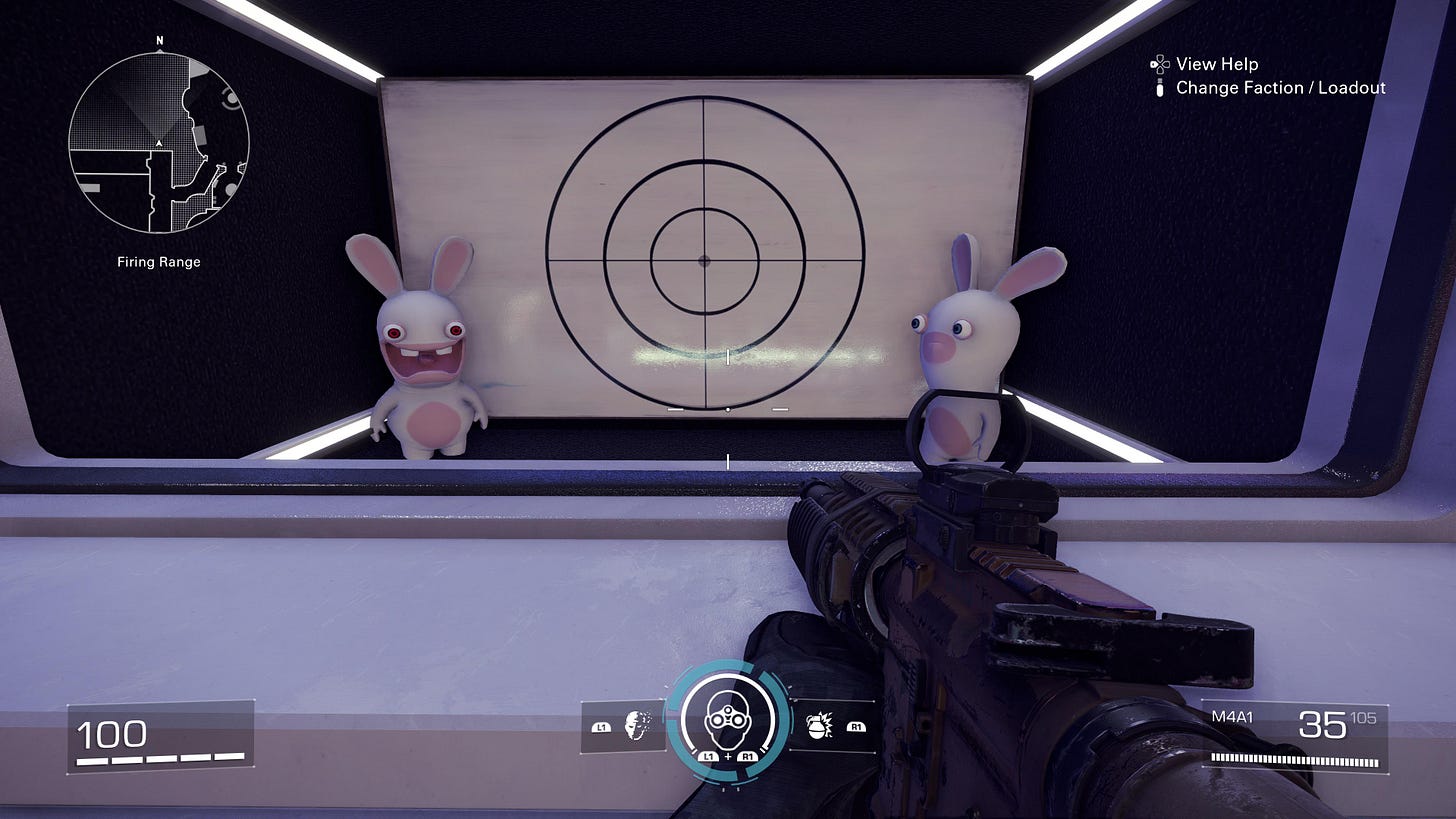Ubisoft's most challenging year yet culminates in the closure of its Call of Duty killer and increased chatter of a buyout
Generally, it is not a positive sign when your company's share price rises against word of its acquisition.
Please, spare a thought for the Guillemot family, the noble custodians of Ubisoft: a French multimedia monolith in the midst of marketing malaise and a misguided makeover. You may find sympathy in their plight to retain ownership of their crumbling empire, resembling a significantly less intriguing spin on Succession: instead of Logan Roy’s signature rants, we have Yves Guillemot’s middling memos. We can all relate to their struggle, particularly in their desire to perform poorly at their job and still have career security.
Excuse my glib manner, yet I cannot help but find a perfect microcosm for this industry’s mortal sins in Ubisoft’s Dantean fall from grace. Whereas its closest contemporary in Electronic Arts have managed to adjust their carnivorous diet of multiplayer titles to a more omnivorous model, Ubisoft’s rapidly shuttering suite of live-service experiences has not been counterbalanced by succinct single-player stories. Though the Assassin’s Creed series has continued to perform to a high commercial standard, its notoriety has been challenged by rival franchises that managed to surpass its individual elements: notably Elden Ring through its environmental exploration and Ghost of Tsushima via its masterful blend of stealth and swordplay.
In their lateral additions, providing content atop their established formula rather than altering their gameplay, Ubisoft have allowed their competitors to iterate upon the essential elements of the franchise. Ironically, the one instance they tried to evolve a beloved component of the series - in Black Flag’s seafaring skullduggery - they were waterlogged by mismanagement, the Singaporean government, and one too many As to its name. Instead of fostering an immersive sim on the high seas, Ubisoft prioritised the perpetual plundering of its player’s wallets: first through its $70 point of entry, then through its persistent content updates. This decision was predicated upon the greed of its shareholders, not the demand of its players: now, the former has no faith in their company, and the latter have no interest in playing anything with their signature swirl on its box art - even if Star Wars appears in its title.
Sources: Ubisoft are exploring a potential acquisition by the Hutt Clan, saving them from being thrown into the Sarlacc Pit.
Evidently, Ubisoft are headed for Davy Jones’ locker. However, the Guillemot family believe they can reverse this tide; they do not picture themselves as the captains going down with their ship. Through their partnership with Tencent, Ubisoft can stave off hostile takeover attempts - as they did during Vivendi’s attempt to subsume the company. Had Vivendi succeeded, they would have gutted Ubisoft in a similar manner to Gameloft: a company founded by Yves’ brother in Michael Guillemot. In spite of Ubisoft's questionable creative intentions, maintaining competition in the medium is essential; placing France’s gaming industry under Vivendi’s purview would have led to a more perilous place than the studio is now in. However, through this lifeline thrown to them by Tencent, Ubisoft have failed to seize a new lease on life, exhausting their legacy brands and setting unreasonable expectations for their aspirant intellectual property.
In this time, an unfortunate number of their titles have been unceremoniously decommissioned or abandoned:
Rainbow Six: Extraction, within the same year of its release;
Hyper Scape, despite its novel streaming integration;
Roller Champions, swiftly adjusting from its seasonal model; and
XDefiant, the critical blow to their integrity.
The scale Ubisoft had to maintain following their averted takeover meant that modest successes would not be enough. With their robust valuation, their sales had to be appropriately prodigious. This meant a reliance upon their iconic brands in Assassin’s Creed or Far Cry, along with a desire to make fringe franchises in Watch Dogs or The Crew household names. Starting a series from scratch prioritised patience over immediate profitability. Now, Ubisoft’s known commodities have lost their lustre, and collaborations with third-party properties in Avatar and Star Wars suffered through their association with the studio. Thus, in conceiving of XDefiant, Ubisoft wanted a game that was not a Call of Duty competitor: they wanted a Call of Duty killer.
XDefiant’s closed beta gained notoriety through its attempt to deliver a cutting edge multiplayer experience built atop Massive Entertainment’s Snowdrop engine of Mario + Rabbids fame. The streaming community raised its profile through this time, delivering solid audience numbers - conducive to broader grassroots support. However, the game slipped from an ostensible release in October 2023 to March 2024, where it was delayed once again to its ultimate bow in May. Publicly, we knew this was due to its failure to conform to Sony and Microsoft’s certification standards; internally, the story was less streamlined. Its documented issues with its netcode were driven by a splinter of its development team known as “The Boys Club”: a group known for their cronyism and overt desire to render the title as close to Call of Duty as they could. Their leading stewardship began as the Tom Clancy moniker was dropped in 2021; this was when the game’s integrity began to unravel as their ambition grew.
Despite XDefiant’s wide range of Ubisoft franchises, you could not play as a Rabbid, nor Rayman.
Though XDefiant debuted to an astounding 1 million players on launch, its popularity waned against word of its curious hit detection and lack of skill-based matchmaking in unranked games - beneficial in principle, yet it made casual engagement difficult. Dropping into the game on a whim meant swiftly adapting to an evolving meta and fierce competition, rather than easing into its design once again. Though SBMM has its drawbacks, it has helped Call of Duty to endear the broadest audience imaginable. Thus, against cascading reports of XDefiant’s imminent demise, executive producer Mark Rubin refuted each with an assurance of Ubisoft’s support: their philosophy was to improve its design before beginning a bigger marketing push to “bring new players to the game and to bring back players that have left.” This was in October - less than two months later, Ubisoft announced the game would be removed from storefronts effective immediately, before its ultimate shutdown in June 2025. Additionally, both Ubisoft San Francisco and Osaka would be shut down, with approximately 277 employees laid off.
Were there better projects to commit to, rather than doomed propositions in XDefiant and Skull and Bones? Regrettably, there were none capable of emerging from Ubisoft’s current state. These titles represent the culmination of their corporate malpractice, chasing trends drawn from their own preferences, rather than the industry writ large. These games were not for the players, they were for queasy shareholders, clinging to its peak valuation instead of its potential points of contention. Now, XDefiant’s capsizing - far worse than Skull and Bones, due to its initial promise - is the beginning of an unfortunate new chapter for Ubisoft: anyone interested in a macrotransaction?






Ubisoft is such a frustrating company. They are capable of making great games, I'm a fan of most of them, but their leaders are always so focused on jumping into every new trend.
It's always the "Fortnite-inspired", the "call of duty killer" or the "botw clone" and I'm so tired.